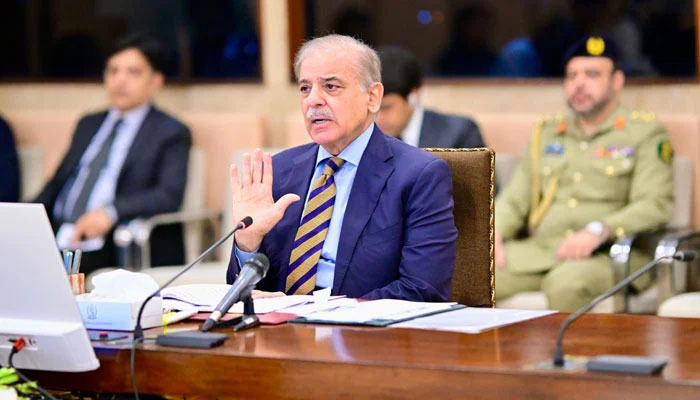PM chairs federal cabinet meeting today
Meeting will also approve appointment of Chairman of the NIRC
ISLAMABAD: Prime Minister Shehbaz Sharif has convened meeting of the Federal Cabinet today (Monday) afternoon which besides taking up other matters, will also discuss and approve the Haj Policy-2025.
The federal government, previously had withdrawn its decision to get the Haj Policy 2025 passed by the Federal Cabinet through circulation of and is now being presented at Cabinet meeting.
The Saudi Government had allotted a quota of 179,210 Hujjaj for Pakistan which would be bifurcated equally (89,605 each) between the government and private Haj schemes. Out of the government Haj scheme, at least 5,000 seats would be reserved for sponsorship scheme, under which applicants would require to deposit their Haj dues in foreign exchange remitted from abroad through banking channels. The intending pilgrims of the government sponsorship quota would be exempted from balloting and extended on the first-come-first-served basis.
Quota of 25,000 of private Haj scheme would be reserved for sponsorship scheme. For the government Haj scheme, there would be the traditional long package of 38 to 42 days and a short package of 20 to 25 days.
Ministry of Interior will place a summary for establishment of the Islamabad Central Business District Development Authority. The meeting will also approve appointment of Chairman of the National Industrial Relations Commission (NIRC).
The cabinet will also accord approval to signing of protocols of Force Labour Convention 1985 and Maritime Labour Convention 200. The meeting will also approve signing of five years programme for cooperation between ministries of foreign affairs of Pakistan and Turkmenistan. The meeting will approve Jammu and Kashmir Estate Property Budget for the fiscal year 2024-25.
-
 Victoria Wood's Battle With Insecurities Exposed After Her Death
Victoria Wood's Battle With Insecurities Exposed After Her Death -
 Prince Harry Lands Meghan Markle In Fresh Trouble Amid 'emotional' Distance In Marriage
Prince Harry Lands Meghan Markle In Fresh Trouble Amid 'emotional' Distance In Marriage -
 Goldman Sachs’ Top Lawyer Resigns Over Epstein Connections
Goldman Sachs’ Top Lawyer Resigns Over Epstein Connections -
 How Kim Kardashian Made Her Psoriasis ‘almost’ Disappear
How Kim Kardashian Made Her Psoriasis ‘almost’ Disappear -
 Gemini AI: How Hackers Attempt To Extract And Replicate Model Capabilities With Prompts?
Gemini AI: How Hackers Attempt To Extract And Replicate Model Capabilities With Prompts? -
 Palace Reacts To Shocking Reports Of King Charles Funding Andrew’s £12m Settlement
Palace Reacts To Shocking Reports Of King Charles Funding Andrew’s £12m Settlement -
 Megan Fox 'horrified' After Ex-Machine Gun Kelly's 'risky Behavior' Comes To Light
Megan Fox 'horrified' After Ex-Machine Gun Kelly's 'risky Behavior' Comes To Light -
 Prince William's True Feelings For Sarah Ferguson Exposed Amid Epstein Scandal
Prince William's True Feelings For Sarah Ferguson Exposed Amid Epstein Scandal -
 Nick Jonas Gets Candid About His Type 1 Diabetes Diagnosis
Nick Jonas Gets Candid About His Type 1 Diabetes Diagnosis -
 King Charles Sees Environmental Documentary As Defining Project Of His Reign
King Charles Sees Environmental Documentary As Defining Project Of His Reign -
 James Van Der Beek Asked Fans To Pay Attention To THIS Symptom Before His Death
James Van Der Beek Asked Fans To Pay Attention To THIS Symptom Before His Death -
 Portugal Joins European Wave Of Social Media Bans For Under-16s
Portugal Joins European Wave Of Social Media Bans For Under-16s -
 Margaret Qualley Recalls Early Days Of Acting Career: 'I Was Scared'
Margaret Qualley Recalls Early Days Of Acting Career: 'I Was Scared' -
 Sir Jackie Stewart’s Son Advocates For Dementia Patients
Sir Jackie Stewart’s Son Advocates For Dementia Patients -
 Google Docs Rolls Out Gemini Powered Audio Summaries
Google Docs Rolls Out Gemini Powered Audio Summaries -
 Breaking: 2 Dead Several Injured In South Carolina State University Shooting
Breaking: 2 Dead Several Injured In South Carolina State University Shooting




